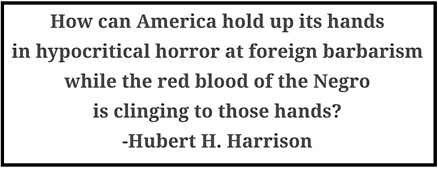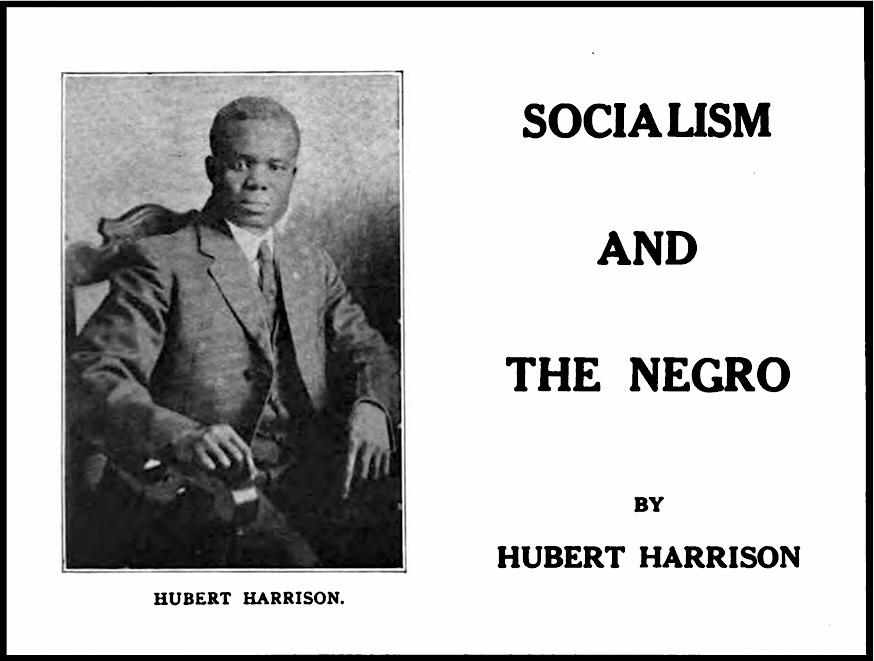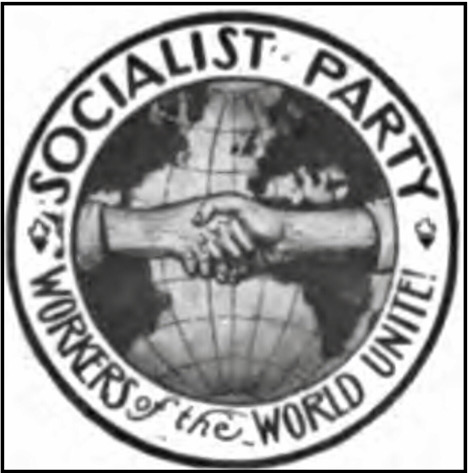 —————
—————
Hellraisers Journal – Thursday July 18, 1912
“Socialism and the Negro” by Hubert Harrison, Part II
From the International Socialist Review of July 1912:
[Part II of II]
The Duty of The Socialist Party.
I think that we might embrace the opportunity of taking the matter up at the coming national convention. The time is ripe for taking a stand against the extensive disfranchisement of the Negro in violation of the plain provisions of the national constitution. In view of the fact that the last three amendments to the constitution contain the clause, “Congress shall have power to enforce this article by appropriate legislation,” the party will not be guilty of proposing anything worse than asking the government to enforce its own “law and order.” If the Negroes, or any other section of the working class in America, is to be deprived of the ballot, how can they participate with us in the class struggle? How can we pretend to be a political party if we fail to see the significance of this fact?
Besides, the recent dirty diatribes against the Negro in a Texas paper, which is still on our national list of Socialist papers; the experiences of Mrs. Theresa Malkiel in Tennessee, where she was prevented by certain people from addressing a meeting of Negroes on the subject of Socialism, and certain other exhibitions of the thing called Southernism, constitute the challenge of caste. Can we ignore this challenge? I think not. We could hardly afford to have the taint of “trimming” on the garments of the Socialist party. It is dangerous-doubly dangerous now, when the temper of the times is against such “trimming.” Besides it would be futile. If it is not met now it must be met later when it shall have grown stronger. Now, when we can cope with it, we have the issue squarely presented: Southernism or Socialism-which? Is it to be the white half of the working class against the black half, or all the working class? Can we hope to triumph over capitalism with one-half of the working class against us? Let us settle these questions now-for settled they must be.
The Negro and Political Socialism.
The power of the voting proletariat can be made to express itself through the ballot. To do this they must have a political organization of their own to give form to their will. The direct object of such an organization is to help them to secure control of the powers of government by electing members of the working class to office and so secure legislation in the interests of the working class until such time as the workers may, by being in overwhelming control of the government, be able “to alter or abolish it, and to institute a new government, laying its foundation on such principles, and organizing its power in such form, as to them shall seem most likely to effect their safety and happiness”-in short, to work for the abolition of capitalism, by legislation-if that be permitted. And in all this the Negro, who feels most fiercely the deep damnation of the capitalist system, can help.
The Negro and Industrial Socialism.
But even the voteless proletarian can in a measure help toward the final abolition of the capitalist system. For they too have labor power-which they can be taught to withhold. They can do this by organizing themselves at the point of production. By means of such organization they can work to shorten the hours of labor, to raise wages, to secure an ever-increasing share of the product of their toil. They can enact and enforce laws for the protection of labor and they can do this at the point of production, as was done by the Western Federation of Miners in the matter of the eight-hour law, which they established without the aid of the legislatures or the courts. All this involves a progressive control of the tools of production and a progressive expropriation of the capitalist class. And in all this the Negro can help. So far, they are unorganized on the industrial field, but industrial unionism beckons to them as to others, and the consequent program of the Socialist party for the Negro in the south can be based upon this fact.
[Emphasis added.]
~~~~~~~~~~~~~~~~~~~~~~~~~
SOURCES & IMAGES
Quote Hubert Harrison, The Voice re St Louis Horror, July 4, 1917
When Africa Awakes
The “Inside Story” of the Stirrings and Strivings
of the New Negro in the Western World
-by Hubert H. Harrison
Porro Press, 1920
(search: “east st louis horror”)
https://books.google.com/books?id=DV9NAQAAMAAJ
International Socialist Review
(Chicago, Illinois)
-July 1912, p67
https://www.marxists.org/history/usa/pubs/isr/v13n01-jul-1912-ISR-gog-ocr.pdf
See also:
Hellraisers Journal – Wednesday July 17, 1912
“Socialism and the Negro” by Hubert Harrison, Part I
Theresa Serber Malkiel (1874-1949)
https://en.wikipedia.org/wiki/Theresa_Malkiel
Race in the Election of 1912
https://ehistory.osu.edu/exhibitions/1912/race/racein
American Socialism and Black Americans
From the Age of Jackson to World War II
-by Philip Sheldon Foner and Elizabeth Vandepaer
Greenwood Press, 1977
https://books.google.com/books?id=aiRtAAAAIAAJ
Paul Robeson (1898-1976)
https://en.wikipedia.org/wiki/Paul_Robeson
~~~~~~~~~~~~~~~~~~~~~~~~~
Testimony of Paul Robeson before
the House Committee on Un-American Activities, June 12, 1956
Paul Robeson sings to Scottish miners (1949)


